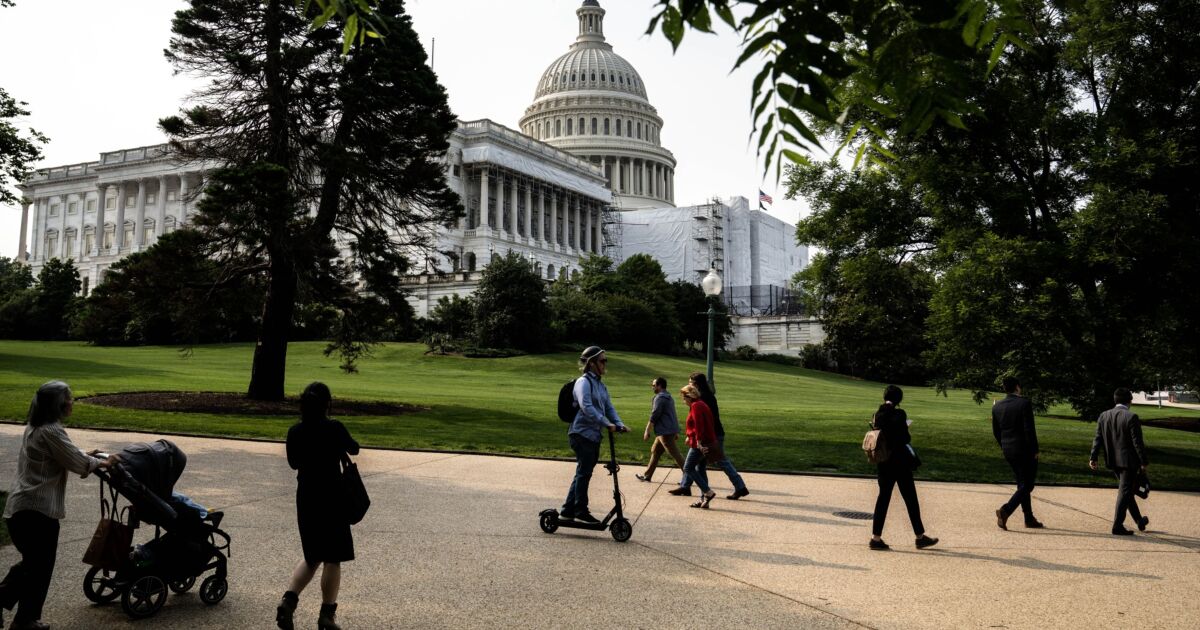House Republicans want to impose work requirements on some Medicaid recipients up to 64 years old and impose more costs on some beneficiaries to help pay for President Donald Trump’s planned sweeping tax package.
The moves, unveiled by Republican leaders in draft legislation Sunday night, are described as ways to better protect coverage to people who most need it. Critics counter that millions of recipients will have trouble navigating complex reporting systems and lose coverage.
The proposed cuts to the federal health insurance program that offers coverage for poor and disabled Americans are shaping up as one of the most contentious fights in the fiscal package.
At least 13.7 million people would lose health insurance by 2034 as a result of the bill, which also curtails some Affordable Care Act coverage, according to analysis from the nonpartisan Congressional Budget Office. In total, all the committee’s changes — including those unrelated to heath care — would save the federal government at least $912 billion, the group said.
The bill offered by the Energy and Commerce Committee also includes a menu of other moves, ranging from raising millions of dollars by reauthorizing FCC spectrum auctioning to retaining some unspent climate-related spending — which the committee’s chairman, Brett Guthrie of Kentucky, calls “Green New Deal-style waste.”
The committee Republicans didn’t include the president’s request to force drugmakers to accept lower payments for prescriptions covered by Medicaid by tying them to prices the companies charge foreign governments. Trump, separately on Sunday, said he plans to unveil an executive order on drug pricing Monday morning that would mandate Americans pay no more than people in whatever country has the lowest price.
A public hearing by the panel is set to begin Tuesday afternoon to advance its proposals.
Medicaid represents a substantial chunk of the panel’s jurisdiction.
The work requirements target so-called “able-bodied adults without dependents.” Broadly written, it would exclude parents with dependent children, pregnant women, those with a disability and people with substance abuse disorders.
Republicans are also proposing expanding the fees that some poor and disabled enrollees pay for health care services. The plan also includes a measure that would cut federal funding for states that use their own funds to cover health services for undocumented immigrants.
Guthrie in an op-ed in the Wall Street Journal published Sunday characterized the changes as addressing “Medicaid waste and abuse.” He highlighted that the legislation would roll back regulations on Medicaid eligibility and enrollment practices established under President Joe Biden, saving the federal government $172 billion over a decade.
“When so many Americans who are truly in need rely on Medicaid for life-saving services, Washington can’t afford to undermine the program further by subsidizing capable adults who choose not to work,” Guthrie said.
Democrats have attacked the idea of curtailing health coverage to help defray tax cuts they portray as skewed toward wealthier taxpayers. Some moderate Republicans from swing districts have warned they won’t go along with Medicaid cuts they consider too deep.
The plan unveiled by the committee Sunday night was already being criticized by Democrats as going far beyond simply attacking waste and fraud, implementing measures that could make it difficult for even people who qualify to maintain coverage.
“The overwhelming majority of the savings in this bill will come from taking health care away from millions of Americans,” said Frank Pallone, the top Democrat on the committee. “Nowhere in the bill are they cutting ‘waste, fraud, and abuse’ — they’re cutting people’s health care and using that money to give tax breaks to billionaires.”
The cumulative paperwork burden could be substantial. Beyond proving some enrollees work at least 80 hours per month, Republicans also want to implement more frequent checks on whether some people in the Medicaid program are actually qualified to receive benefits. Checks would occur for people insured through the Affordable Care Act’s expansion population every six months, instead of annually.
The committee also proposes limiting states’ ability to pay their share of Medicaid by placing a moratorium on new or increased taxes on medical providers. Some states tax health care providers such as hospitals to help raise money for state Medicaid budgets. States would also be limited from seeking new payments for providers that exceed Medicare payment rates.
Critics say limiting provider tax rates would simultaneously limit states’ ability to pay their higher tab as a result of the reductions to federal matching funds.
Health care industry groups that represent insurers and hospitals have lobbied opposing the Medicaid cuts. Hospitals face higher uninsured rates if spending cuts result in more people losing insurance coverage, and insurers that manage Medicaid programs make less money if fewer people are enrolled. Insurers Centene Corp., Elevance Health Inc., UnitedHealth Group Inc., Molina Healthcare Inc., and CVS Health Corp. are major players in administering Medicaid plans.
Senior pharmaceutical executives mounted a furious lobbying campaign to stop Trump’s drug pricing proposal, which the industry’s largest trade group told lawmakers could cost drug companies as much as $1 trillion in revenue over a decade. The industry got a surprise win in the form of a tweak to the Inflation Reduction Act which would allow drugs to be exempt from Medicare’s drug price negotiation program if they are approved to treat multiple rare diseases.


 Blog Post3 days ago
Blog Post3 days ago
 Economics1 week ago
Economics1 week ago
 Personal Finance7 days ago
Personal Finance7 days ago
 Economics7 days ago
Economics7 days ago
 Economics1 week ago
Economics1 week ago
 Accounting7 days ago
Accounting7 days ago
 Personal Finance1 week ago
Personal Finance1 week ago
 Finance7 days ago
Finance7 days ago










